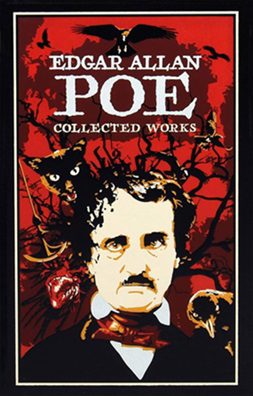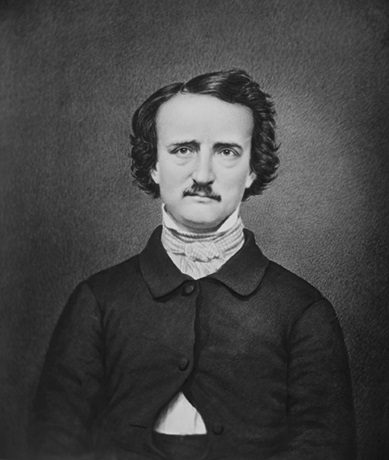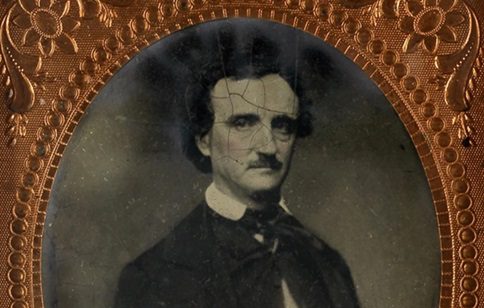Edgar Allan Poe was an American writer, poet, editor, and literary critic best known for his tales of mystery and macabre. He was born on January 19, 1809 in Boston, Massachusetts and died on October 7, 1849 in Baltimore, Maryland at age 40. A central figure in American Romanticism and a pioneer of gothic fiction, Poe’s work often explored themes of death, madness, and the supernatural. He is considered one of the earliest masters of the short story and is credited with inventing the modern detective story, influencing the development of science fiction, and popularizing horror literature.
Here’s Vincent Price (an icon in is own right) reading a number of Poe classics for your entertainment:
How influential was Edgar Allan Poe? Well, as the National Park Service website notes: “Poe was the first to introduce a character that solved the mystery by analyzing the facts of the case.”
Early Life and Career
Poe was born in Boston, Massachusetts, on January 19, 1809. He was orphaned at a young age after his mother died of tuberculosis, and his father abandoned the family. Poe was taken in by John and Frances Allan, a prosperous couple from Richmond, Virginia.
Though never formally adopted, Poe lived with them through much of his youth. He attended the University of Virginia but left due to financial difficulties, leading to a strained relationship with his foster father. He briefly served in the U.S. Army and later pursued a career in writing, starting with poetry before moving to short stories and literary criticism.

Literary Contributions
Poe’s poetry, like his famous work The Raven, is known for its haunting rhythm and melancholic themes. A lot of it could go well with music like Beethoven’s “Moonlight Sonata.” His other notable poems include Annabel Lee, The Bells, and To Helen. However, Poe is perhaps most celebrated for his short stories, which often feature unreliable narrators and delve into psychological horror.
Some of his best-known works include
1. The Tell-Tale Heart:
A chilling tale of murder and guilt, where the protagonist is first driven mad by the sight of a man’s “culture eyes,” then by the sound of his beating heart.
2. The Fall of the House of Usher:
A story about a decaying mansion and the mysterious relationship between twins that reflects the gothic atmosphere Poe was famous for.
3. The Cask of Amontillado:
A dark story of revenge and entrapment, where a man seeks vengeance on a friend by sealing him alive within a wall.
4. The Pit and the Pendulum:
A gripping tale of torture during the Spanish Inquisition (what makes this story scarier is that, of course, the Spanish Inquisition is infamous for its torture techniques).
Detective Fiction and Innovation
As mentioned earlier, Poe is also credited with creating the first modern detective story with The Murders in the Rue Morgue, which introduced C. Auguste Dupin, an amateur detective whose method of solving crimes through deductive reasoning laid the groundwork for later fictional detectives like Sherlock Holmes. This established the “locked-room mystery” genre. The character of Dupin last appears in The Purloined Letter.
Personal Struggles and Death
No Poe bio would be complete without mentioning how Poe’s life was marked by personal tragedy and financial hardship. He struggled with alcoholism and depression, and his marriage to his 13-year-old cousin Virginia Clemm was marked by sorrow, particularly as she suffered from tuberculosis and died in 1847.
It’s reasonably speculated that her tragic condition inspired Poe’s Annabel Lee, The Raven, and Ligeia”
Poe’s own mysterious death in 1849, after being found delirious on the streets of Baltimore, remains a subject of speculation, with theories ranging from alcohol poisoning to illness or foul play. English Professor and Poe aficionado Susan Elizabeth Sweeney notes: “Poe had an intense personality, was charismatic, gallant, principled, and very sensitive. He lived a troubled, romantic and sad life.”
That being said, let’s not overlook that Poe’s work has actually enriched people’s lives, actually bringing happiness to those who enjoy it.

Legacy
Poe’s influence on literature is vast. His exploration of the human psyche and dark emotions paved the way for later writers of gothic horror, science fiction, and even modern psychological thrillers. Authors like H.P. Lovecraft, Arthur Conan Doyle, and Stephen King have cited Poe as a significant influence.
His works continue to be widely read and adapted, cementing his legacy as one of the most important figures in American literature. In addition to his literary achievements, Poe’s keen insight into the mechanics of storytelling and his skill as a critic helped shape the landscape of American letters during his time, even though his life was tragically short.
Nevermore.
 PopHorror Let's Get Scared
PopHorror Let's Get Scared




